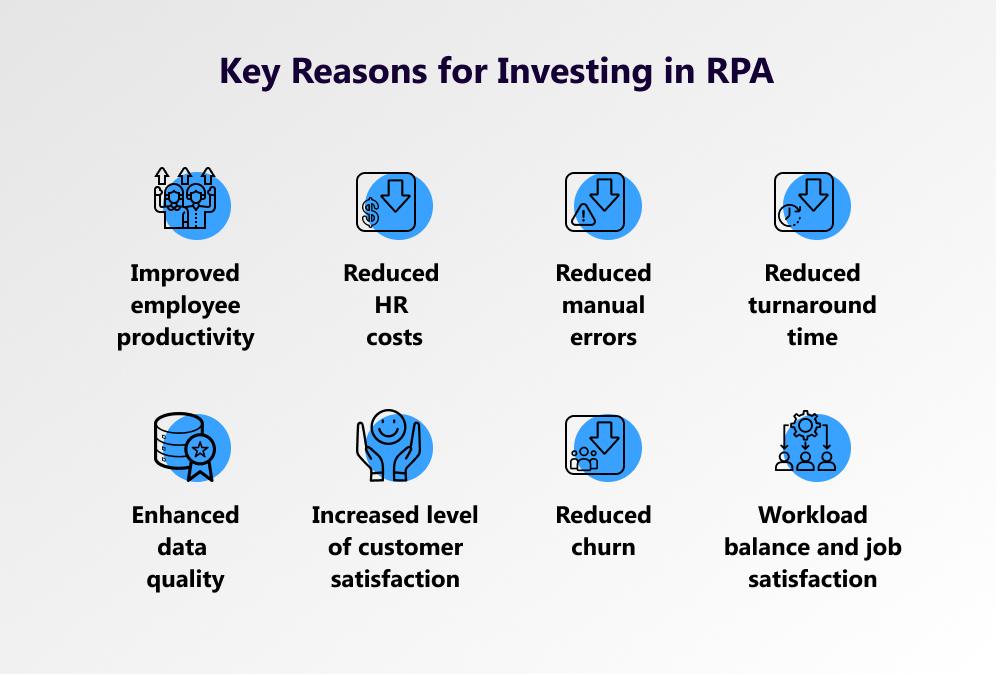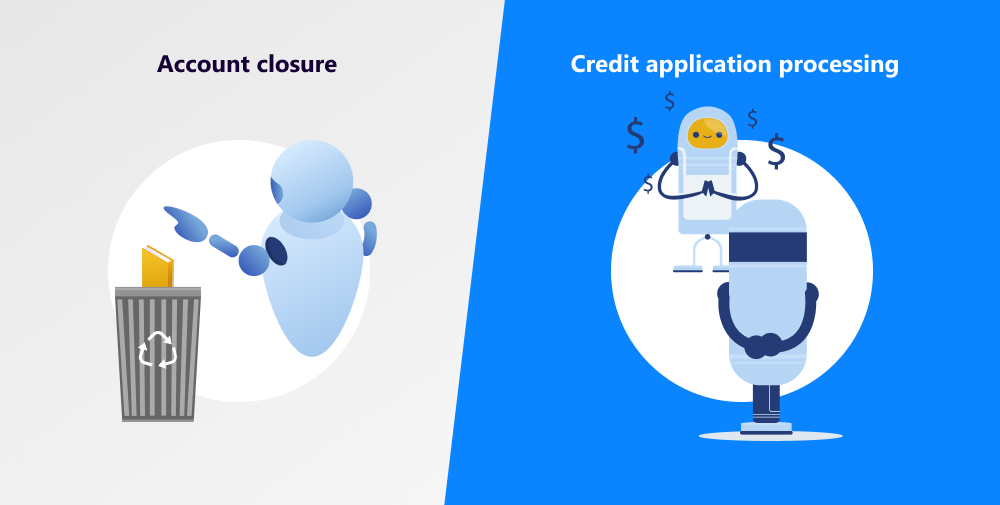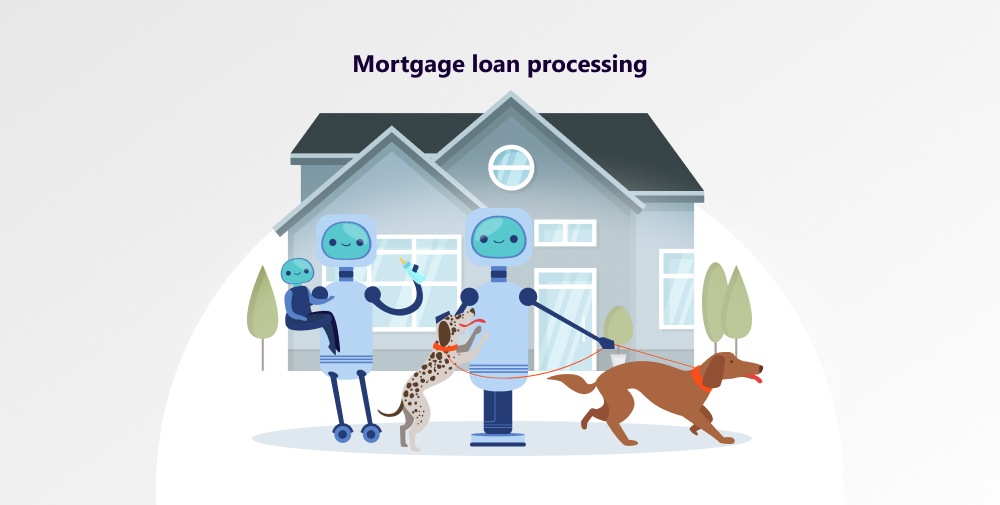As SSON Analytics states banking is one of the leading industries actively focused on software robot implementation to improve business results and customer service standards. Given that the cost of human error in banking and financial services can be extremely high, creating intelligent bots definitely seems a smart decision. Today we’re going to describe some specific robotic process automation (RPA) use cases in banking, which help a lot in optimizing daily workflow routine, reducing operational costs, and retaining customers.
written by:
Anastasia Borodinets
As SSON Analytics states banking is one of the leading industries actively focused on software robot implementation to improve business results and customer service standards. Given that the cost of human error in banking and financial services can be extremely high, creating intelligent bots definitely seems a smart decision. Today we’re going to describe some specific robotic process automation (RPA) use cases in banking, which help a lot in optimizing daily workflow routine, reducing operational costs, and retaining customers.
Just try to imagine that banks of the digital age can afford a monotonous multi-hour work day after day without trying to change the state of things. This seems an unlikely scenario, don’t you think?
In this regard, a vivid interest and investments in RPA across all banking and financial institutions are quite natural and predictable today. Obviously, it is not simply curiosity and scientific interest that drives banks in their active involvement in the robotics industry. Rather, it is new or additional revenues that it creates. See for yourself: the latest report by Capgemini’s Digital Transformation Institute states that the financial services industry could reap up to $512 billion in new global revenues thanks to intelligent automation by the end of 2020!
Although we all understand intuitively that banks and financial services firms can benefit from robotic process automation, let’s find out exactly how the technology can help them keep ahead of the competition.
Why Are Banks Investing in RPA?
Pretty impressive, ha?
At the same time, to implement RPA in banking successfully every CEO should determine which tasks are ready for automation, as well as choose the most appropriate ways to automate them.
Certainly, it’s only natural for you to follow the path of least resistance: avoid a tiresome route of learning from your own mistakes and start immediately from analyzing RPA use cases in banking instead.
Now it’s time to see some of them. Let’s study the brightest examples of intelligent automation in banking and find those that you can apply.
9 RPA Use Cases in Banking
Integration of legacy and current core banking IT systems
Almost all banks have such a common problem like system incompatibility. RPA is a perfect way to make different systems connect with each other seamlessly. With Robotic Process Automation implementation, it becomes possible to transfer data from and to numerous databases, core banking systems, and applications.
Data consistency and accuracy are essential powerful attributes of success in financial services.
Data management
Robotic process automation in banking can greatly help with another key attribute of a successful business – timely financial and operational performance data delivery.
For banks and financial institutions, such activities like data collection, processing, and aggregation are critical. Moreover, to ensure easy reading of reports and their successful processing without unpredictable delays, data needs to be cleansed for frictionless formatting between different apps.
Utilize RPA to handle these tasks easily.
Suspicious activity monitoring
Given that it’s impossible for banks to have an extensive staff of employees who would track the activity of each and every account 24/7, some suspicious transactions may easily go undetected.
RPA adoption can greatly facilitate account activity tracking.
Implementing robotics in banking is a simple way to help fraud detection teams. Robotics doesn’t get tired or exhausted and can contribute to the bank security greatly by identifying potentially fraudulent transactions and notifying relevant persons in time 24/7/365.
Verification of customer identity
Quick customer servicing is a significant component of quality customer experience. However, client verification sometimes takes longer than the client wants, given the sensitive nature of the client’s data that banks store.
To simplify the client’s identity verification, some banks use RPA in their call centers. With an RPA solution, all appropriate customer service documents or account information can be displayed on a single screen in a convenient format to quickly and easily verify the identity of your clients.
Bank card management
Robotics can support processes such as card locking, chargebacks, damaged/stolen or lost card replacement, based on the client’s request.
Since the requests are often repetitive, RPA implementation will reduce the workload on your employees and help them focus on performing tasks that require human involvement and a creative approach to problem-solving.
Account creation
Manual processing of applications or personal identity verification often takes hours, if not days. Sure thing, few clients of yours can afford wasting so much time for the processes to complete.
This is exactly the case where RPA bots help a lot with increasing your customer base by creating an ideal customer experience.
Use RPA to process client information, run checks, as well as set up accounts quickly and seamlessly.
Account closure
There can be different reasons to close the account. One of the most common is when the client does not submit mandatory documents in time.
However, closing a bank account is usually a lengthy and time-consuming process, since the cancellation of direct debits, money transfer from one bank to another, etc. takes long if done manually.
Implementing automation tools in the banking sector now is an efficient way to eliminate the problem easily.
Intelligent bots can track the accounts to be closed, send automated notifications, as well as close the account quickly with no manual intervention in case customers fail to provide KYC documents.
Credit application processing
Traditional credit application processing includes multiple steps like credit history, background information, and other checks, which may require even weeks to process.
By using bots in credit card processing, banks can reduce the time required to approve/decline credit card applications just to a few minutes!
Moreover, if any important data are missing from the application, the software bot can send a detailed email immediately notifying the applicant of the information that should be given to the bank.
Mortgage loan processing
Since it is so natural for human beings to want a place of their own, the demand for mortgage loans is always high.
At the same time, the long and boring process of applying for a mortgage may become a discouraging factor for many people.
Thus, a delayed process, which in some cases can take several weeks, can lead to a decrease in the number of applicants and therefore the bank’s profitability.
RPA bots can simplify analyzing the information about the applicant’s background, employment and credit history, etc., as well as reduce the verification process from weeks to days (or even hours) and increase the number of mortgage applications.
Concluding Lines
Now you have read about the most common ways to use intelligent techs in modern banking. As you can see, the banking area has a lot of relatively simple, repetitive, and much-needed manual processes – like data management, bank card management, account creation/closure, credit application processing, and the others listed above – which can be automated. That’s why it seems natural that today banks are learning actively more about what RPA solutions they can implement and start investing in the technologies. What’s more, in most cases investment demonstrates an almost immediate return!
Sure, besides those mentioned above, there are many more truly efficient use cases of robotic process automation in financial services which can help banks generate additional revenues, save time, and enhance the customer experience.
So if you want your business to thrive in the long perspective, explore and apply the above examples of RPA in banking or approach us with your own idea of business automation. In turn, Qulix Systems will be happy to share with you our domain insights, get the custom software ready and implemented for you and also optimize those areas of your business activities that can be automated in the future.
Ready to transform traditional financial operations but still feel lost in RPA automation and don’t know where to start? Get in touch with us! Our experience in implementing RPA tools for the banking sector will help your business make the best use of top-notch technologies and successfully compete in the market.

Contacts
Feel free to get in touch with us! Use this contact form for an ASAP response.
Call us at +44 151 528 8015
E-mail us at request@qulix.com












